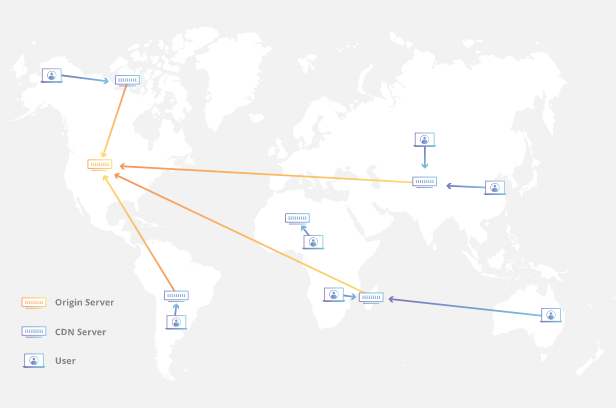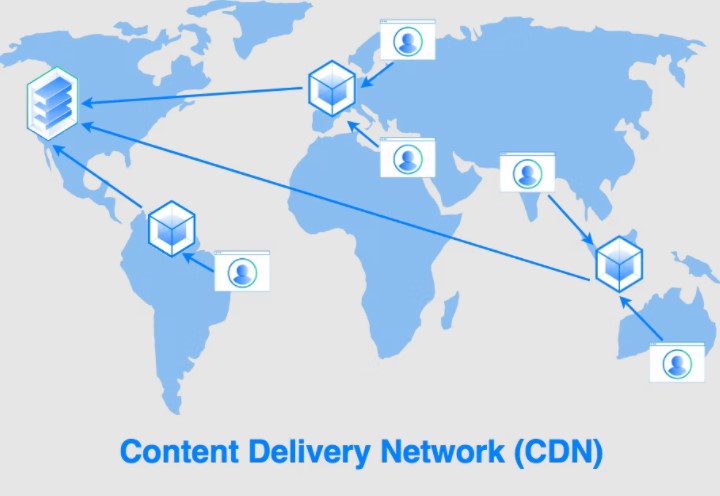Have you ever imagined how a website can load all the content on its page? Of course it’s stored on a server right? Maybe when we talk about a website, we cannot get away from what is called a content delivery network or what is commonly known as a CDN.
Before reading further, for those of you who want to know more about Netdata, you can contact us directly via the link below.
Consultation Via WhatsappHowever, what exactly is a CDN? Maybe there are still many who don’t know this yet, right? So, let’s discuss!
Table of Contents
Discussion of Content Delivery Networks
When discussing CDN, indeed the word that intersects the most is “cache”. Yes, this CDN is usually called a cache. Maybe if on your cellphone or computer, the cache is a trash that makes storage full. However, this is the original form of a CDN, namely creating a cache that can load various kinds of content on a website.
Content delivery network is basically a content. But what is content? And what is a content delivery network or CDN?
What Is Content?
We will limit the content that is on a website. Web content refers to the textual, aural or visual content published on websites. Content means any creative elements, for example, text, applications, images, archived e-mail messages, data, electronic services, audio and video files, and so on.
Web content is the key behind the generation of traffic to websites. Creating attractive content and organizing it into different categories for easy navigation is of the utmost importance for a successful website. Also, it is important to optimize web content for search engines so that it responds to the keywords used for searches.
Definition of Content Delivery Network
CDN refers to a geographically distributed group of servers that work together to provide fast Internet content delivery.
CDNs allow for the rapid transfer of assets needed to load Internet content including HTML pages, javascript files, stylesheets, images, and videos. The popularity of CDN services continues to grow, and today the majority of web traffic is served through CDNs, including traffic from major sites such as Twitter, Youtube, Netflix, as well as Amazon.
How Do CDNs Work?
Understanding how a CDN works will probably be very easy. So basically a CDN is a network of servers connected together with the goal of delivering content as quickly, cheaply, reliably and securely as possible. To increase speed and connectivity, a CDN will place servers at exchange points between different networks.
These internet exchange points (IXPs) are the main locations where different internet providers connect to give each other access to traffic originating from their different networks. By having connections to these high-speed, highly interconnected locations, CDN providers can reduce costs and transit times in high-speed data transmission.

In addition, the CDN makes a number of optimizations to standard client or server data transfers. CDN places the most strategic locations around the world.
Use of CDNs
CDNs weren’t created for nothing. Of course, if you use a CDN on a website, maybe if you are interested in everything related to a website that has good speed and quality, then a CDN will be very suitable.
However, what are the uses of a CDN?
1. Reduce Bandwidth
CDN can reduce bandwidth costs. So a CDN can reduce data transfer costs as it sits between the user and the website hosting server, or origin server, reducing traffic between the hosting server and the rest of the internet.
2. Increase Speed
When visiting a website that contains content, users will quickly leave when the site slows down. CDN services can help reduce load times in the following ways:
- The globally distributed nature of a CDN means that it reduces the distance between users and website resources.
- Hardware and software optimizations such as efficient load balancing and solid-state hard drives can help data reach users more quickly.
- CDNs can reduce the amount of data transferred by reducing file sizes using tactics such as minification and file compression.
- CDNs can also speed up sites using TLS/SSL certificates by optimizing connection reuse and enabling TLS false start.
3. Increase Security
Information security is an integral part of a CDN. CDNs can keep sites secure with new TLS/SSL certificates that will ensure high standards of authentication, encryption and integrity.
4. Improving Content Distribution
Most obviously, a CDN can improve content distribution to your website. Poor content distribution makes various content not load properly. The result, of course, is that the content doesn’t run smoothly and it loads slowly and causes downtime.
CDN can improve content distribution. Downtime is something that many website owners don’t want, of course, everyone wants their website to stay online. Uptime is an important component for anyone who owns internet property. Hardware failures and traffic spikes, as a result of malicious attacks or simply increased popularity, can potentially bring down web servers and prevent users from accessing sites or services.
Who Needs a Content Delivery Network?
The biggest question is, do you need a content delivery network? CDN is indeed very important for a website, but for more complex purposes. CDN is very important for many types of websites, but not all types of websites require a CDN as important.
If you look at the CDN itself, of course it is for the needs of a website that is professional and closely related to users.
E-commerce
Simple reliability is another appeal of using an e-Commerce CDN for your website. When you use a traditional server, your site is prone to crashes. Content delivery networks rarely go down and even when they do, so many merchants are affected that they usually resolve quickly.
Advertising
For websites that are useful for advertising, of course the CDN is the most important thing. This type of website advertising is very important because if there is downtime, of course it will make many users who should be interested in the products offered become unable to know what is being offered.
A good website advertising server and good content distribution will make many people interested in what you have to offer because the website looks professional. Remember, a website is an important portfolio.
Entertainment
For example, entertainment-type websites that offer video streaming really need a CDN. By connecting to servers around the world, CDNs can create a shorter route for video streaming from the platform to viewers’ computers or phones. Using this large network of servers makes scalability possible as the number of views increases. Here are some other benefits of using a CDN provider:
1. Speed
Content delivery networks deliver content with low latency. When the local network lags behind, the CDN is on the through lane, bypassing the local network and speeding up to get to the viewer on time.
2. Quality
High quality video, with minimal lag time. Exactly what viewers wanted.
3. Security
Business is full of classified information. CDNs provide an extra layer of security because of that. Using a CDN will prevent security attacks from occurring when a site or resource is overwhelmed by attempts to breach it.
The best CDNs offer consistent speeds, high-quality video delivery, and security.
NetData is a company that provides technology-based services with the best service and quality, if you are interested in us you can contact us directly via this link or via our contact form here.
![]()


